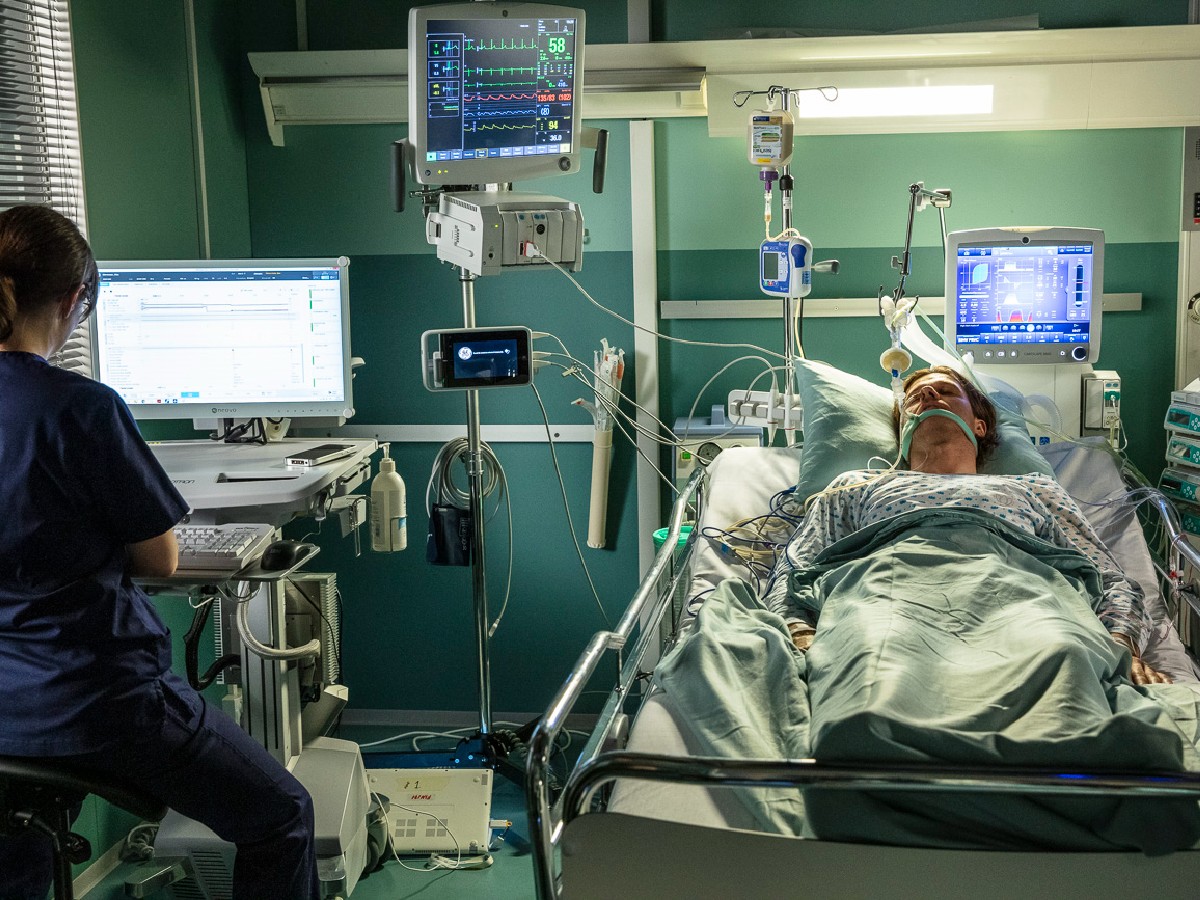The intensive care unit is a medical wonder of the 20th century, bringing together specialized doctors and nurses, sophisticated monitoring devices and systems to support the organs of patients with life-threatening conditions. The COVID-19 era has demonstrated the importance of intensive care units (ICUs) in saving the lives of people with severe illnesses and developing innovations in care that will benefit future patients.
But having a loved one in the ICU can be hard on family members. Patients are hooked up to unfamiliar and intimidating machines, sometimes sedated and unable to express their preferences. Their condition and prognosis can vary dramatically from day to day. Fears about the patient’s possible death may loom over every conversation.
Professor Élie Azoulay, who heads the ICU at Saint-Louis Hospital (AP-HP) in Paris, is leading a five-year, 9-million-euro project to detect, prevent and mitigate how family members are affected by the ICU. The project is called FAME: Improving Family Members’ Experience in the Intensive Care Unit, and it includes nearly 80 ICUs in France, as well as psychiatrists, social scientists and others. GE Healthcare is the project’s major industry partner.
Azoulay has spent the past two decades studying how healthcare professionals communicate with family members. He explains that healthcare professionals are already familiar with post-ICU syndrome, a group of symptoms that can include anxiety, depression, stress and insomnia.[1] The syndrome can affect not only patients, but also their families. “It’s really related to how much an ICU can be technical, stressful and how much of a roller coaster is the patient’s outcome every day,” he says.
The FAME consortium wants to learn more about which family members of ICU patients may be most at risk of developing post-traumatic stress disorder, or PTSD, but also to develop solutions to detect, prevent and mitigate this condition. The disorder appears to be common among people with an ICU experience, even if they are not patients themselves. In one of Azoulay’s early studies on this subject, he and other researchers found that three months after a patient stayed in the ICU, 30% of family members surveyed had significant PTSD. For patients who died in the ICU, the prevalence of PTSD among family members was 60%.[2]
Azoulay and his co-researchers have found that improved communication can reduce these PTSD rates. In a 2007 study published in the New England Journal of Medicine, they tested a protocol for clinicians to talk with family members about a patient’s end-of-life situation.[3] “When the communication strategy was family-centered, and we were able to give time to family members to let them voice concerns and provide us with important opportunities to help them, there was a decrease in the number of family members with anxiety and depression, and a decrease in the number of family members with PTSD,” he says.
The unique personalized approach of the FAME project is that researchers plan to gather blood and other samples from family members of ICU patients to identify the biomarkers of PTSD, recognizing that chronic stress leaves physical traces on the body. Using genomic and other data, the researchers hope to pinpoint which family members are most at risk of PTSD and to offer them healthcare resources. The project will follow family members for up to six months after a patient is discharged from the ICU.
“We’re really excited because we’re moving from pure research focused on family-centered care to concrete personalized solutions in care for family members, which is something we’ve wanted to do for quite a long time,” says Nancy Kentish-Barnes, a sociologist who with Azoulay co-directs the Famiréa Research Group, which studies ICU experiences.
As an industry partner in the FAME project, GE Healthcare plans to develop specific features in the GE patient data management system that will gather information from family members to help predict who is at risk of developing PTSD. Another goal is to add a feature to the monitor that provides simple, frequent updates about the patient’s condition, helping family members feel included in their loved one’s care.
“When finalized, the project will help GE Healthcare develop a software containing specific and personalized family-centered features to help prevent family PTSD. Our IT solution will then be supporting a holistic approach for a better ICU experience — not only for the patient but also for the family, the healthcare providers and ultimately the entire healthcare ecosystem,” says Marc Wysocki, GE Healthcare medical director.
Project members plan to design tools to help educate family members — everything from virtual reality to cartoons and videos that will inform them about what’s happening in the ICU environment. They also will offer follow-up care to family members, whether from a nurse listening to their concerns after a patient has been discharged or a psychologist or another healthcare professional offering resources for recovery.
“In the ICU, we have a model where PTSD can be detected and screened very early,” Azoulay says. “If we take the example of France, 1 million people every year will be family members of ICU patients.[4] One-third of those will develop PTSD. They take a lot of antidepressants; they are absent from work — there are huge direct and indirect costs. We need to work closely with our industry partners to develop marketable products and cost-effective interventions that will have an impact.”
REFERENCES
[1] Rawal G, Yadav S, Kumar R. Post-intensive Care Syndrome: an Overview. J Transl Int Med. 2017; 5 (2): 90-92. Published 2017 Jun 30. doi:10.1515/jtim-2016-0016.
[2] Azoulay E, Pochard F, Kentish-Barnes N, et al. Risk of Post-traumatic Stress Symptoms in Family Members of Intensive Care Unit Patients. Am J Respir Crit Care Med. 2005; 171(9): 987-94. Published 2005 May 1. doi: 10.1164/rccm.200409-1295OC.
[3] Lautrette A, Darmon M, Megarbane B, et al. A Communication Strategy and Brochure for Relatives of Patients Dying in the ICU. N Engl J Med. 2007; 356: 469-478. Published 2007 Feb 1. doi:10.1056/NEJMoa063446.
[4] The French Annual Statistical Survey of Healthcare Facilities reported 259,073 adult and 16,016 children stays in 2020.

